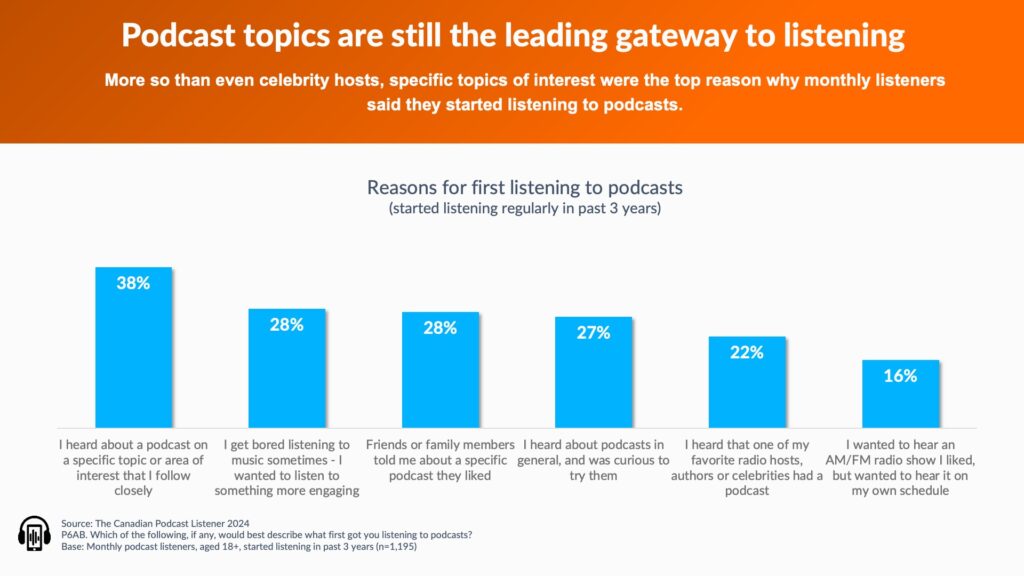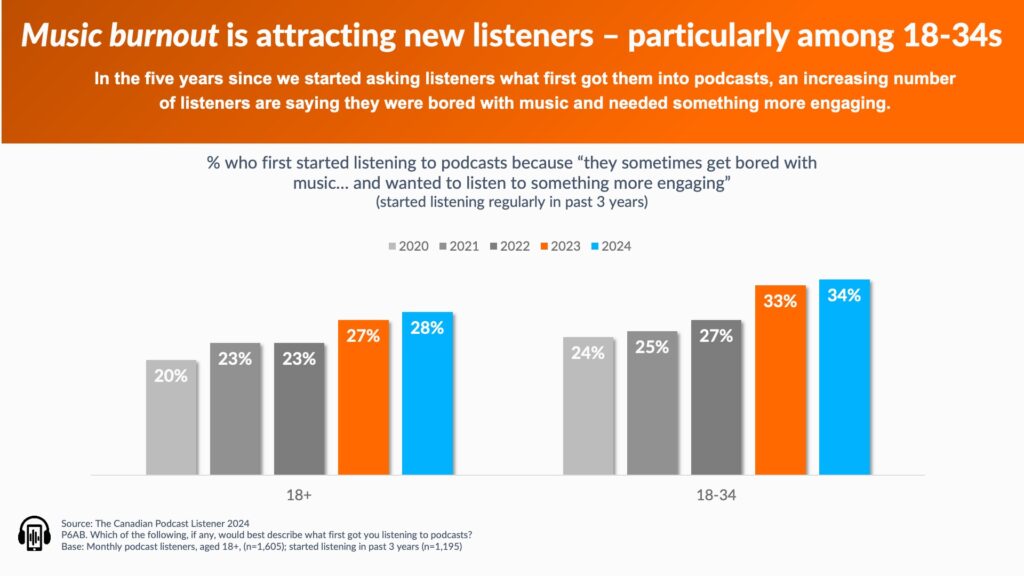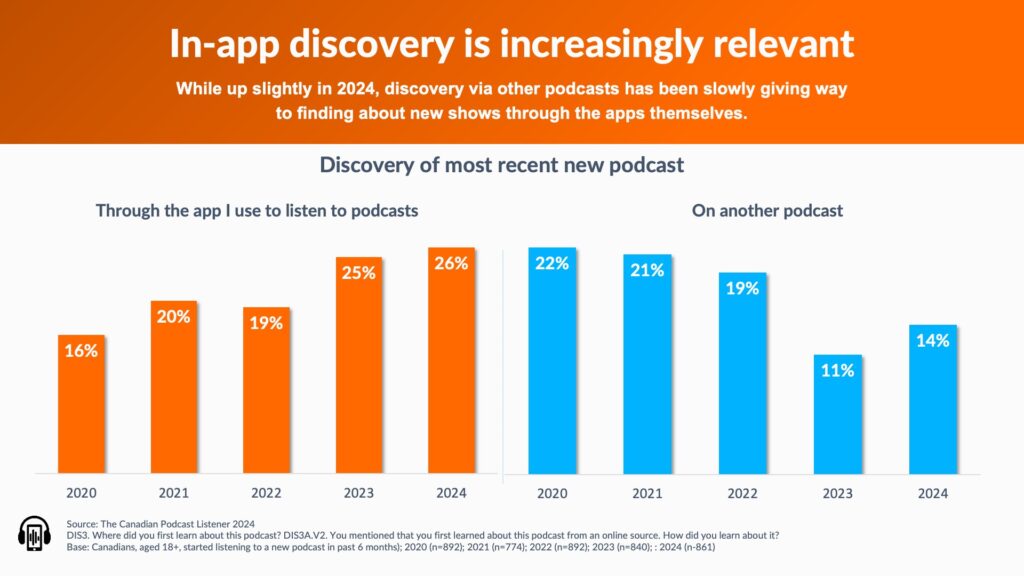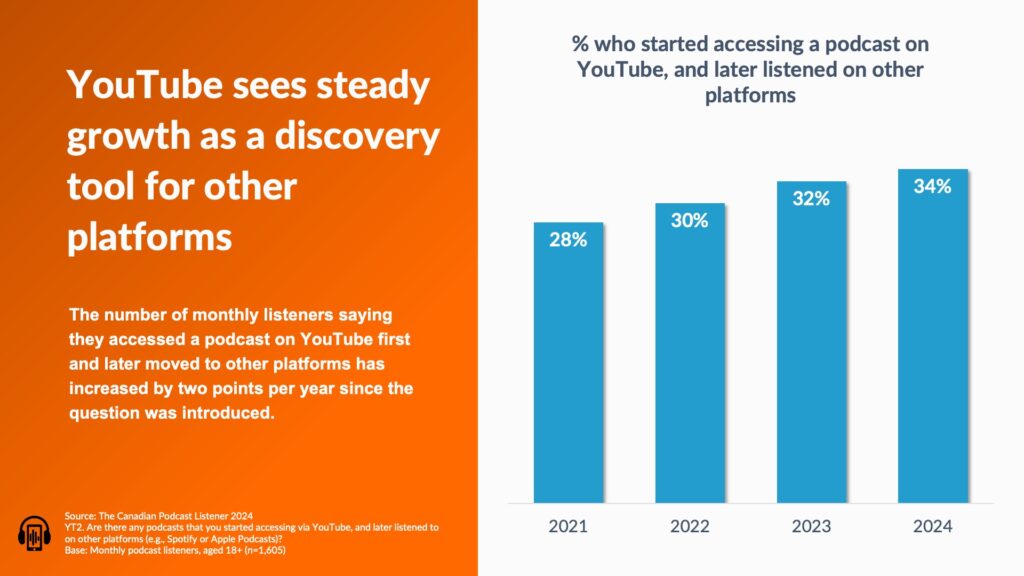The ways in which podcast listeners are finding their next favorite show are constantly evolving. With discovery being so key to podcast growth, publishers and podcasts keep a keen eye on discovery trends year after year. It’s something we track in The Canadian Podcast Listener, so we’re pleased to present this guest post from our partner Jeff Ulster, the co-producer of this annual survey, who examines these shifts and how to respond.
As podcasting continues to evolve, the reasons why people choose podcasts – and the way existing listeners discover new shows – are also shifting. For podcasters looking to drive new listenership, research that sheds light on the latest trends in podcast discovery is foundational for building an effective audience growth strategy.
To illustrate how podcasting has changed, when we began gathering survey data in the first Canadian Podcast Listener study back in 2017, many Canadians (27%) weren’t even aware what a podcast was. Spotify was still a music-only platform in Canada. Video podcasts were the exception more than the rule. TikTok had barely launched and was not yet a phenomenon in North America. So much has changed since then, including the ways that people find new podcasts and the things that inspire them to press the play button.
So, what influences the decision to listen to podcasts today, and how is it changing?
Influence #1: A Listener’s Interest in Your Topic
For those beginning their podcast journey, the leading gateway to listening has been very consistent over the years: they learned about a podcast that covers a specific area of interest. This is also the primary motivator for current podcast listeners to find something new, and it’s also twice as important as any other factor when people decide to listen to a podcast for the very first time (68% of monthly listeners say this).
This topic-driven decision-making lines up with some of the things listeners say they like most about podcasts – “learning something new”, and “becoming more knowledgeable” are always among the top-ranking reasons for listening.

Marketing-savvy podcasters lean into this insight – designing their episode artwork, writing clear titles, descriptions and promo copy, tagging and optimizing for search engines – all to increase their odds of pulling in new listeners who have an interest in that specific topic.
Influence #2: They’re Burning Out on Music
The number two reason Canadians say they started listening to podcasts? They got bored of listening to music.
While true today, this has not always been the case. In 2020, a fifth of listeners said being bored with music was a reason to try podcasts, making it the fourth most popular response. In 2024, 28% of listeners gave this reason.
Has music become more boring? While that’s a different question entirely, it’s worth noting that this is an even more popular reason to choose podcasts among younger Canadians: 34% for those aged 18-34 agreed.
Furthermore, choosing podcasts over music has become easier over time, as podcast listening continues to move towards multichannel platforms. More than three quarters of monthly listeners now have both music and podcasts available to them within the same app, up from just over half in 2020. This makes sense when you take into account that Spotify didn’t offer any podcasts at all in Canada until 2018.

Clearly, for bored music listeners to find your podcast it needs to be where they are. This leads us to our next influence.
Influence #3: Podcast Apps
Podcast apps are now the most common method for discovery of new podcasts – another big change we’ve observed. In 2020, only 16% of monthly listeners said they discovered their most recent new podcast through their podcast app. That rose to 26% in 2024.
At the same time there has been a decrease in people saying they discovered a new podcast by hearing about it on another podcast. The percentage of listeners saying this is their discovery path dropped from 22% in 2020 to 14% in 2024.

Spotify and YouTube are currently the leading apps for podcast discovery in Canada. In 2024 YouTube inched ahead of Spotify to top the list for the first time (31% vs 30%) among people who discovered a new podcast via an app. It’s a significant shift compared to 2022, when only 15% said YouTube helped them find a new podcast, and 39% credited Spotify.
Influence #4: YouTube
As widely discussed in the industry, YouTube’s influence on podcasting is unavoidable, and growth-focused podcasters should have a strategy. It’s not only the leading app for discovery, it’s also the most-used platform for consuming podcasts. Podcast listeners even say that it’s the second-most popular discovery point among social media platforms, and digital media channels in general.
Convenience is the reason most people say they use YouTube to watch or listen to podcasts, since they already use it for other things, including music.
Having said that, YouTube audiences are not exclusive to that platform. Most (68%) YouTube podcast consumers say they also listen to podcasts on audio platforms.
Even if they discover a podcast on YouTube, more than one-in-three of all monthly podcast listeners say they listened to the same exact show on other platforms – with an increase of two points per year since the question was introduced in 2021. That means YouTube also can be a gateway to those other platforms.

Be Available, Be Heard… and Be Seen
It’s imperative to stay on top of how audiences get into podcasts and discover new shows. Yesterday’s assumptions may not hold true today, as the influences continue to shift over time. Whereas recommendations from another podcast have long been thought to be the most important discovery tool, today’s listeners are more likely to be introduced to new shows through their podcast app.
That’s true even if they’re not necessarily looking for podcasts. Your next listener might be shifting their attention over from music, not just from another podcast.
Audiences may also be finding your show based on their subject area of interest. They’re potentially one search result away from becoming new listeners to your podcast.
While it may sound simplistic to say that your show needs to be where the audiences are, all the data does point that way – and YouTube is undeniably part of the mix. Podcasters looking to increase their reach can leverage this by making it effortless for potential new listeners to understand what your show is about and hit that play button.

Jeff Ulster
Jeff Ulster is co-publisher of The Canadian Podcast Listener: A Landscape Study, partnering with Signal Hill Insights. He is also the owner of Ulster Media, an independent podcast consulting and production company. Jeff is co-founder of The Podcast Exchange (TPX), and also serves as TPX’s strategic consultant.




